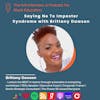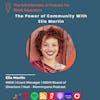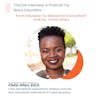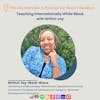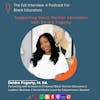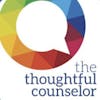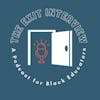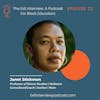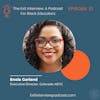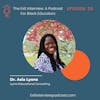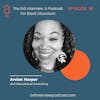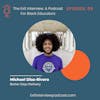
Episode 38: Educator to Education Consultant with Dr. Cletis Allen
In this episode of The Exit Interview, Dr. Asia Lyons and special guest Dr. Cletis Allen delve into the educational journey of black educators. Dr. Allen, an advocate for culturally responsive literacy instruction and a curriculum development specialist, shares her transition from a classroom teacher to a consultant. Discussing the importance of teacher participation in curriculum decisions, shared experiences of navigating through educational careers, and the significance of seeking joy and satisfaction in personal and professional life. This episode sheds light on challenges faced by black educators and explores the transformative power of education.

In this episode of The Exit Interview, Dr. Asia Lyons and special guest Dr. Cletis Allen delve into the educational journey of black educators. Dr. Allen, an advocate for culturally responsive literacy instruction and a curriculum development specialist, shares her transition from a classroom teacher to a consultant. Discussing the importance of teacher participation in curriculum decisions, shared experiences of navigating through educational careers, and the significance of seeking joy and satisfaction in personal and professional life. This episode sheds light on challenges faced by black educators and explores the transformative power of education.
First of all.... have you signed up for our newsletter, Black Educators, Be Well? Why wait?
Amidst all the conversations about recruiting Black educators, where are the discussions about retention? The Exit Interview podcast was created to elevate the stories of Black educators who have been pushed out of the classroom and central office while experiencing racism-related stress and racial battle fatigue.
The Exit Interview Podcast is for current and former Black educators. It is also for school districts, teachers' unions, families, and others interested in better understanding the challenges of retaining Black people in education.
Please enjoy the episode.
Peace out,
Dr. Asia Lyons and Kevin Adams
Dr. Cletis Allen: [00:00:00] I think it's really important to have The actual teachers who are actually going to be implementing the curriculum to be a part of the process when it comes to choosing. Because at the end of the day, I understand when it comes to like financial budgets and Decisions that are made at a district level, that everything trickles down and those decisions affect what happens in the classroom.
So when we're considering those voices, we need to make sure that the teachers are not only at the school board meetings. But they are also in those conversations when it comes to making those choices, as I said.
Dr. Asia Lyons: Welcome to The Exit Interview, a podcast for Black educators, where we, Dr. Asia and Kev, delve into the crucial but often overlooked conversations surrounding the retention of Black educators. While the spotlight shines in recruiting efforts, we turn our [00:01:00] focus to the stories of those who've left the field of teaching.
The Exit Interview aims to spark dialogue among school district administrators, school unions, families, educators, and anyone else passionate about fostering a more inclusive and supportive educational environment. Join us as we elevate these narratives, shedding light on the challenges faced by Black educators, and providing valuable insights for the future of education.
Welcome to The Exit Interview.
Welcome back to the episode of The Exit Interview, a podcast for Black educators with me. Dr. Asia Lyons and today another special guest. We keep this guest fire all day long and today is no different. Before I have Dr. Allen come in and introduce herself, I'm going to read her bio so that you all know what we're dealing with today.
All the magic that we're in the presence of today. So Dr. Cletus Allen is an educational thought [00:02:00] leader with over 13 years of experience in multiple roles in education, including elementary classroom educator. Professional Learning Facilitator, Curriculum Auditor and Writer, and Governing Board Member of a local charter high school with licensures in Reading, English Speakers of Other Languages, ESOL, and K 5 Science, Dr.
Allen is the owner of her elementary education consulting firm, Cletus Education Consulting, LLC. In her doctoral work, a document analysis of the presence and relationship between Schwab's commonplace in a literacy curriculum that's adopted in high need schools, Dr. Allen examines the roles and interconnectedness of content, teacher, learner, and learning spaces in a literacy curriculum and the opportunities to incorporate culturally responsive literacy instructional practice during the curriculum adoption and instructional implementation.
She works with large and small educational organizations. to incorporate cross curricular [00:03:00] strategies from a culturally responsive literacy instruction, CRLI, perspective across content areas. In addition, Dr. Adams supports educators, educational leaders, And professionals with cultivating CRLI and inclusive practices in their daily instruction within P5 learning spaces.
Outside of education space, Queen Klee, I love that, enjoys time with family and friends. She spends time reading, traveling, eating vegan food, and crocheting. Welcome to our show. Thank you. That was a mouthful. It took everything I had to get that one out.
Dr. Cletis Allen: I know it can be a little extensive, but I just wanted to be comprehensive of who I am, not only as a person, but as a professional in the education space.
But thank you for having me on your podcast.
Dr. Asia Lyons: Yeah, of course. The folks always want to know the things, always want to know how people move in and share in space and how they end up moving from a classroom educator to what you're doing [00:04:00] now. So we'd love to hear about that. So let's go ahead and get this started.
Tell us about your educational journey, how you knew you wanted to be an educator, what that journey looked like for you. Let's
Dr. Cletis Allen: hear it. Okay. So I have actually a different pathway from most. Educators, when they are deciding if they want to become a teacher when they were younger, to be quite honest, I did not want to be a teacher.
I try my best to not go into education at all because I had as a child, my own perspective of teaching because growing up in Chicago, I had an experience. I was like, yeah, I'm not going to be a teacher, but I always found myself in teaching. Experiences where I'm tutoring folks. I was a part of like junior national honor society where I'm supporting people in those ways when I was in high [00:05:00] school.
And then when I got to college, I actually went to college for nursing. Oh, okay. So I thought I was going to be a nurse working with children. So I thought I was going into pediatric nursing. But when I started, taking the classes, I said, Oh no, I'm not going to work with children in that way. So I transitioned into the education field and it just took off from there.
So that is my pre teacher educational journey. And once I became a classroom teacher and I continue to get these degrees. I really understood, what I wanted to do as a teacher, the populations that I wanted to serve, but most importantly, I also wanted to advocate for teachers in different levels in different spaces.
So in a nutshell, that's how my journey started.
Dr. Asia Lyons: Yeah. And I feel like so many folks who come on the podcast start in a different career field or imagine themselves doing something different. I [00:06:00] myself was in chemical engineering. And mostly because that's what my dad wanted me to do and then found the education path in a whole different way that most people do.
So how long were you teaching? It sounds like you might have done some coaching work. We'd love to hear about that. And where did you teach? So
Dr. Cletis Allen: I started my career teaching in Georgia and in Atlanta metropolitan area. And I started teaching pre K, loved pre K. Then I moved to kindergarten, loved kindergarten.
Like I love those younger grade levels because. You have an opportunity to really mold those children and give them those first experiences when it comes to like formal schooling within the U. S. education system. So I really enjoyed that experience, which started in 2012. And I taught a high ESOL population or EL, depending on where you are in the country.
And I loved it. [00:07:00] But then I transitioned into another school after four years. I went to Atlanta public schools. And I taught in the Bankhead area or, the Westside area, if anyone is familiar with, Atlanta, and I enjoy my experience there as well because those children reminded me of me and how I grew up and, those experiences.
So I taught first grade, I taught third grade, and then I taught third grade EIP, which is like small intervention classroom. But while I was there, I also was one of their district science and literacy ambassadors. So while I was teaching,
Dr. Asia Lyons: you signing up for a lot of work here
Dr. Cletis Allen: while I was teaching, yeah, it was also not only writings like their science curriculum, but I was also doing pD for the district. So I was teaching and then doing the curriculum, writing curriculum work. And that was my first [00:08:00] introduction into doing that. And I loved it. I love doing curriculum work. I love writing, putting the resources together, but also while I was in that role, I felt like I was also being an advocate, ensuring that the materials were diverse for the children that we were serving.
across the district. So that was again a great experience for me. So did that. I was there for three years and then I went back to my old district and became one of their MTSS and section 504 coordinators at an elementary school. So because within my degree, you talk MTSS process. That was an easy transition into that role.
So by the time I get to basically year 10, I finished my doctorate. And when that, and when I finished my doctorate, that's when I transitioned into curriculum development with my company. So overall that's, [00:09:00] yeah, so that's my journey.
Dr. Asia Lyons: Yeah. It's interesting. Had a few folks with doctors on the podcast and they still, they find their way out of the classroom in different ways.
When you talk about transitioning, when you went back to school to get your doctorate, we want to hear about that journey because so many folks are thinking about that. Was it always a plan to leave after you finished or how did you come about that decision?
Dr. Cletis Allen: So what I'll do is take a step back because you asked me, what was that journey of actually going into like doctoral work, right?
Okay, so when I finished my first degree in 2011, I went actually back to get my master's the same time. I was actually in undergrad in grad school at the same time, which is, I wouldn't advise anyone to do, but I was able to do it. I was young. I was ambitious. I did it. So I finished my master's degree in 2013.
I ended up going back to get my education specialist degree. In 2014 and finished that in 2015. So by the time I got into my specialist degree, [00:10:00] I was like, I think I can really add to something. I really wanted to talk about, my experiences when it comes to like curriculum and teaching and things like that, I didn't know how I wanted to do it, but I was like, okay, I can do this.
So I actually talked to some of my old professors and I was deciding between two different schools. One school was Mercy University, the other school was Georgia State because I got my master's at Georgia State and I got my specialist degree at Mercer. When I made my decision, I was like, I really enjoy the environment when I was at Georgia State.
When I had met some of my classmates, a lot of my professors, we were just closer versus when I was at Mercer. Everything was online. So I didn't have that one on one connection that I did with the professors at George state. So when both of the acceptance letters came back, I just went on ahead to George state.
When I started my program in [00:11:00] 2017, that's when I said, okay, I need to decide what I want to focus on. I know it's curriculum. I know it's going to be something about instruction, but what is it that I really want to look at? And once I got into the courses and reading the research. That's when I understood, I really do align with Geneva Gay's theory of culturally responsive pedagogy.
But I said, no. I really want to look at this also from the curriculum and instruction lens. Like, how does it affect curriculum, which not only includes the materials, but includes the learning space as well. So that's how I included Schwab's Four Common Places as an overall theoretical approach. When it comes to my dissertation and then looked at culturally responsive literacy instruction when it comes to okay, how are teachers being able to add to the curriculum when they are actually implementing it in their
Dr. Asia Lyons: classroom, which is what we always do or have to figure that part [00:12:00] out.
Yeah, for sure.
Dr. Cletis Allen: Exactly. And especially when you're talking about, Teachers, specifically black teachers who are teaching black or other people of color within their classroom. How are they actually using this to support the children that they are serving within their classroom? So that's how I made my decision and then into doing my research.
I say, if anyone is considering, just consider, what do you see as a problem or something that you added? And then go from there. As long as you have a reason as to why you. Are going into the doctoral space that you adding to the work that's there. So you can continue to build on the corpus of research, and then people can build from you.
Yeah, I love
Dr. Asia Lyons: that. So when it's time for you to leave, you're making this decision to leave, right? Tell me what the conversation was with family, with friends, and with co workers of, I'm finishing my doctorate. It's time for me to go. I'm going to go into consulting. What [00:13:00] did that look like? What did that sound like?
Okay.
Dr. Cletis Allen: So let's start with, let's start with family and friends. So my parents, they were hard workers. They been on their jobs for a long time, blue collar jobs. And from their perspective, growing up, it's like you work your job until you make you do your 30 years and then you retire, which for them makes sense because that was the era that they grew up in.
That's what they were taught. When you have the opportunity, you provide for your family. And then you retire and be a grandparent or, live your life or do whatever. But as a teacher, first of all, I understood that I had other skills that I wanted to do outside of the classroom, specifically work with teachers.
And I knew that in order for me to do that, I couldn't stay a classroom teacher in order to [00:14:00] support teachers. So I said, okay maybe I can move on to an instructional coaching role or maybe a district level role, but then just from my experience. When I saw just the level of work that had to be put in and the amount of red tape that some of the people who are in these positions were in, where they couldn't do the work that they really wanted to do, it made me go if I get into these roles, which I know I will be great in.
I want to ensure that I do the work that I feel is going to make an impact within the classrooms. But now, this is not only classrooms, but it's at the administrative level, it's at the district level, and so on and so forth. For me, making the decision and having the conversation with my family is like, Okay, you sure you gonna do this?
Cause Yeah. You put in your 30 years. And you still young and keep in mind when I made the transition in 2021, I [00:15:00] was 31. So it was like, okay, now hold on. Are you sure? It was just those questions, but they supported me because they knew they baby. They knew Cleetus. My siblings, they was like, oh yeah, she's going to be okay.
So having that support from them was great. My friends, of course, they were also very supportive. It was like, oh girl, you got this. I know you can do it. It's new. It's different, but. You can handle this. So that wasn't a problem. Talking to some of my coworkers, they didn't see it at the time. But they knew I had the skills.
So it was like, I know you can do this, but maybe you can do this, as a district level, maybe this role will open up and they'll do it for you. Maybe they'll make an exception for clean. I was like maybe not, but let me just go this route for a minute. And if it doesn't work, I can always go back into the classroom or, do something at the district level because I'm still a licensed educator.
For me, that was the space, but then once I saw the opportunities open, when [00:16:00] I decided to make that transition, I said, Oh I'm going to stay and make it work.
Dr. Asia Lyons: It's interesting that you talk about your family, you from Chicago. And this idea of work the 30 years, get the gold watch. And I feel like so many of us can resonate with that from our parents or grandparents who, like my family's from Detroit, you wait union for a motor company, pension.
And so there's so many of us who are thinking about taking that leap, but have been told either through example, or just actually told that, yeah, like just stay in the job and they'll make an exception for you. Or. Are you sure you want to do that? Things are rough right now. Think about doing something else or making a side hustle instead.
Anything but taking the leap and not that they want to push us away from that ideas, but they really want us to be successful and are scared for us. I feel like more than they're hating. It's just they want to make sure that we can eat.
Dr. Cletis Allen: Exactly. And I think, just to piggyback on what you were saying, again, I [00:17:00] understood my parents perspective when they told me that, because, When are growing up in the seventies and the eighties, they had a different climate and environment as young black people.
So for them, it was like, Hey, we got these good jobs. We're just going to do this so we can support our family. And we want you to be comfortable as well, where you don't have to struggle or, you're trying to go here or they're trying to secure employment. Because also in their mind, it's okay, you're a teacher.
You're going to always have a job. Just continue, down that path. Working years and retire and live comfortably, but there were other plans for my life. And that's how I've decided to continue. And again, they're supportive. Very supportive.
Dr. Asia Lyons: Yeah, that's awesome. I think too, about your colleagues, try this, try that, try this.
And I think a lot of folks who shift into consulting and working for themselves don't necessarily have the experience of having people and generations do it before them, [00:18:00] or know educators who've left the field and do that. And so it's one of those, again, same thing. Maybe the district and the power that we put on the district to do things for us versus us doing things for ourselves is really amazing.
And I remember as a teacher in a school district in here in the rural Denver area thinking like, Oh, my district is this, my district is that. And when I left teaching thinking, Oh my goodness, like this district is a grain of sand. On the beach of all the amazing things that are out there in education that I would have never known had I stayed in the
Dr. Cletis Allen: classroom.
And I definitely agree with that because sometimes I feel and this just could be my experience. I feel like as a teacher in the role of teaching, you're sheltered because your focus is your students. And ensuring that they not only learn, grade level skills, but [00:19:00] they also are successful, with whatever exam that they're taking, whatever benchmarks, so on and so forth.
So in that case, your focus is solely on content and it's also on success of the grade level. So you're not really thinking about all the. Aspects of education, whether it's policy, whether it's curriculum, it, that where I am in now, there's also, when you think about design, there's just so many levels.
To education that unless you see it or you have experience with it or you engage with it, your focus is just on teaching and it's nothing wrong with that as well because they are great educators, especially a lot of our black educators who are very good when it comes to ensuring that our students have a safe space within their learning space and they are really getting the content and those grade level skills.
But there are [00:20:00] others who have more, they have a vision to ensuring that everyone has a better learning experience or an experience that really reflects their life and experience. And that is going to take a leap of faith for you to step out of what is norm and ensuring that you not only maybe create a niche, but you can also find a space.
That can cultivate those skills as well.
Dr. Asia Lyons: Yeah. I love that. I remember thinking after I left teaching for six years, I taught fifth grade for six years, I taught sixth grade and I remember coming out and thinking, I'm a sixth grader, but I was so much on the thing, like teaching that there was so many other things that I did not know or understand, just like you're saying.
I'm like my, in some ways, my growth was stunted by me. Because I was so focused on this one area and going out and first working in the nonprofit sector and then going into business allowed me [00:21:00] to grow in all the ways you're talking about. I love that. So I have a question for you around this line. So you, obviously you're leaving education with this idea of no, I'm, this is my plan, right?
It's not necessarily a pushout, but for folks who. And if I'm sure you've seen this in your years of teaching, black educators leaving the field of teaching and the experiences that they've had. So thinking about that in particular, or what do you suggest school districts, unions, folks do to keep black educators in the field of teaching, whether in curriculum instruction, being teach, like in that space?
What are some ideas that you've had based on what you've seen out here in your community?
Dr. Cletis Allen: The first thing I would suggest is for districts to ensure that there is representation of Black teachers when it comes to being a part of the curriculum process, [00:22:00] right? Just to go back to a little bit of my journey, I had the opportunity to be a part of the vetting and auditing process when it comes to curriculum decisions for the district.
So because of that, I felt that was really important and because the district also had just other unique ideas that they had where if a curriculum was chosen that they would go to different schools and have some of the leaders Look at it and see, and maybe a couple of teachers to test it out.
I think it's really important to have the actual teachers who are actually going to be implementing the curriculum to be a part of the process when it comes to choosing, because at the end of the day, I understand when it comes to like financial budgets and decisions that are made at a district level that everything trickles down and those decisions affect, what happens in the [00:23:00] classroom.
When we're considering those voices, we need to make sure that the teachers are not only at the school board meetings, but they are also in those conversations when it comes to making those choices as I said. When it comes to local unions, again, I feel like there needs to be inclusion of teachers when it comes to, their voices with whatever mission or statements that they have for the year.
When I was in the classroom, I was a part of NEA. And GAE. So that's like Georgia Association of Educators, which is like the subsidiary of NEA. And with that, I also had an opportunity to share, some of my concerns across Georgia with Georgia teachers and other leaders and even some policymakers.
When it comes to, what are some of the missions and some of the challenges that teachers are facing and what we can do to support that. [00:24:00] So just ensuring that there is space for me, for teachers to have a voice, but then also listen to some of the solutions and see how we can implement it in ways that serve us.
black children, but children overall. Yeah,
Dr. Asia Lyons: that makes so much sense. And this idea of representation in decision making spaces. So our last guest Yasha Chapman. Shout out to Yasha. She said the exact same thing about being in these spaces where curriculum is decided upon. And she does similar work as you do.
And I definitely should connect you two. Yes. Yes. And I 100 percent agree with that. The decision making spaces. And of course, going back to and paying them for their labor. Because sometimes teachers are so eager just to be seen. I feel like we overdo it for free, right? And for folks who go out into the consulting space, the business space, after being in teaching and doing so many things for free, then we get into a whole another ball of wax.
[00:25:00] about Charging What We're Worth, which I'm going to ask you about in a little bit. Okay. Yeah. So I love that. I love all their suggestions and your ideas. So when we get back from our break, we'll get into my favorite part of the show that we talk about all the things that are happening, what you're up to, what's bringing you joy, and we'll be back in a minute.
Hey there, beautiful people. It's me, Dr. Asia. Before we dive back into our conversation, Kevin and I have something exciting to share with you. Are you a dedicated Black educator or support Black educators? If so, we've got some great news for you. We're thrilled to introduce the latest addition to our podcast community, the Black Educator Be Newsletter.
It's a space dedicated to all things, Black educator healing, wellness, and more. We believe that taking care of our Black educators is crucial, and this newsletter is designed to do just that. Picture this, exclusive insights into self care practices tailored for Black educators, inspiring stories from fellow teachers, and more.
who've overcome challenges and tips for creating a positive and supportive environment at [00:26:00] work and at home. Subscribers will get early access to our upcoming podcast episodes, special interviews with guests, and even some surprise giveaways. How do you become a part of this amazing community? It's easy.
Go to xanterviewpodcast. com or check out the link in this episode's show notes. Now let's get back to the conversation. All right. Welcome back to the show. So if you haven't, if you're just catching up with us, Dr. Allen's given us all the gems. First of all, don't have to go into loving teaching from preschool.
You know, talking about representation and decision making spaces, talking about her ideas around shifting from being an educator to working on curriculum and instruction, families, and how our family supported her. All the things. So now we're going to get into the part that I really love. And the first question that we ask in this section is there a Black educator that you would like to shout out on our podcast?
Dr. Cletis Allen: [00:27:00] Definitely. I have a plethora of friends and colleagues that I would, love to shout out and sing their praises to the mountain top, but I specifically would like to shout out one of my longtime friends. And he's a math educator. He's also a curriculum development specialist in the Chicago lane area.
He actually teaches at my old high school now. Oh, that's cool. Thornton high school. Okay. And his name is Mr. Etheridge, David Etheridge. He actually just finished his specialist degree in leadership and is considering going into the doctoral space. So I just want to shout him out because not only is he very insightful and has an expertise when it comes to math education.
But he's also very active when it comes to NEA and his local NEA. He supports [00:28:00] teachers at his school Whenever he needs to sit in for meetings and be that support. He's always there. He's always advocating for the children Making sure they have multiple opportunities to finish what he's teaching when it comes to math, but also ensuring that he continues his education so he can not only be effective in the classroom, but beyond.
So I just want to give Mr. Etheridge his shout out. He's literally a one day older than me. So he'll always say that, he's older, but literally by a couple of hours. So I really want to shout him out. Thank you. Also, I just want to shout out really my first teacher, which was my mom, she was very active with all of my siblings when it came to our education.
That was very important to her. She always read to us. When I was teaching pre K for my first year, she came from Chicago [00:29:00] down to Atlanta and really read to my children and was engaged because That was who she is in spirit. So anytime she had an opportunity, she always came to support. Mama Allen, I support you.
so much. And we going to continue to do this work.
Dr. Asia Lyons: Yeah, I love that. Shout out mama Allen. Shout out Mr. Etheridge. So the next question is, what are you doing now? We talked about it at the beginning of the show, but we love to hear about your work and then in particular too, for folks who. Are thinking about moving into the consulting space.
Some gems you have that you've come to realize in this space. We love to hear about that too.
Dr. Cletis Allen: Perfect. So right now I am still a consultant when it comes to curriculum writing and development. I worked with one large educational ed tech company, and then I've worked with a few large and small organizations when it comes to curriculum [00:30:00] writing or training development across different States.
Again, I enjoy what I do and I love what I'm doing. As I've said, I'm also a governing board member for a local alternative high school here in the Atlanta metropolitan area. So serving on that also gives me a space to see what governance looks like and how governance not only affects at the administrative level, but Trickles down for the students as well.
And because of my different experiences, when it came to, being as a teacher and then the school board, I just try to make sure that I'm very reflective. And also I try to ensure that I don't do the things that I saw when it came to governance. And ensuring that I'm doing everything that I'm supposed to do with fidelity.
And I think that's really important when it comes to leadership, because when you're on a [00:31:00] governing board, that's the biggest thing you want to make sure there's oversight, but you don't have your hands into what is actually. Being done within the classroom level, but understanding that whatever you decide as a board affects everybody.
So just ensuring that I'm very reflective with that. And I love what I do as I say, so having that experience and being on this board just gives me the other side when it comes to K 12 education. Within, like I said, this Atlanta space. So that's that when it comes to consulting, here's what I say.
First thing I say is make sure that whatever your skill set is or whatever problem you're trying to solve, that you're pretty clear about it. A lot of people, when they're deciding to transition, or if it's just a side hustle. To, do some consulting, whether it's with [00:32:00] teachers or it's with curriculum or anything else, when it comes to education, they try to do everything, which I totally understand because as a teacher, you wear so many hats in the classroom that, a lot of expertise and a lot of things.
But sometimes when you are focused on. Your mission and then the problem that you can solve, it can really attract the type of clients that you would like to work with. So I think that's number one. Also, before you decide to transition into consulting, or again, you're building this business, maybe as a side hustle, start having those conversations with family, friends, and colleagues, and get them to understand your idea or what you would like to do.
And I think that would help plant a seed. So when you decide to maybe be full within your business, or again, if you still want it to be a [00:33:00] side hustle, people will know what you're trying to do. So then your name starts to travel when it comes to different meetings or you're having conversations at conferences or in other spaces like that.
The last, gem that I will also give that maybe a lot of people may miss or may not consider is attend a few conferences and maybe present at conferences as well. That is an opportunity for you to not only network with others within the space, but that gives you a chance to see what other colleagues are doing, not only within the city that the conference is held.
But around the country or even around the world, because you never know who's going to be there. You never know who's going to show up for a session. And if you're presenting, you never know how you can make an impact on those participants, and they may refer you [00:34:00] to their district leader, then you have an opportunity.
So that is. Really vital to even if you can in the summer to attend a conference and really have an opportunity to speak. And there are also some free conferences that you can attend, especially if cost is a factor their opportunities to do that. You would just. Have to do some research or you just gonna, have to make a financial investment and say, Hey, I'm going to attend this conference because I really have a goal in making sure that, I network, I learn more, I connect with other folks.
Also to add to that something I just thought about if you're not a member any type of professional organization it is an opportunity to join one and or two. You know again NEA is a good one. I'm a member of the Black Doctoral Network so I get an opportunity to network also with PhD students [00:35:00] as well.
I'm a member of NCTE so I get an opportunity to network with some of the English teachers. Not only in the Atlanta area, but of course around the country. So that gives you an opportunity to, again, continue to have conversations, tell people the problem that you can solve. And again, that can lead to conversations when it comes to having clients and doing the work that you would like to do.
Dr. Asia Lyons: Yes. Everything you said, doubling down on the conferences, attending, but also speaking. I just got finished, just flew back from Austin and spoke at South by Southwest. Oh, good. Yeah, exactly what you said happened. Weren't a ton of people in the room, but the right people were there to say Hey, I love what you're doing.
Let's connect. I got some ideas about doing this in another part of the country. So I love, love, love that. That was perfect. I'll just leave it that way. Last question. Sure. What's been bringing you joy these
Dr. Cletis Allen: days? Joy. Oh, first [00:36:00] of all, I love food. So food brings me joy. Yes. Yes. I'm vegan, but I'm actually starting to transition to be more raw plant based.
So finding food and places to eat and recipes to try that. First of all, that brings me joy. Cause I love to eat and I love to snack and I love to have energy. So I love food. Spending time with family and friends also brings me joy to see all of the wonderful success that they have and seeing the happiness that they are having within, their spaces of success always brings me joy because of course, I have a level of success, but just to see them, work hard and.
Achieve the things that they plan that they would like to, whether it is career, their own families, or [00:37:00] even if it's simple, self care things, I think that is always awesome. But also what brings me joy is being able to wake up every day and say that I like who I am and I enjoy what I do. And understanding that there are so many levels when it comes to.
Mental illness and, having certain levels when it comes to depression and other things, which are, of course, that's for a different time, a different story, but we all experience it. Even myself, there are times when you feel like, man, if what I'm doing, is it really making an impact? Sometimes you may second guess yourself, but I understand that I was put on this earth to do what I do.
And what I do is unique to the space. But I am me and I like me and I wake up every day enjoying me and my family and friends and significant other enjoys me. So I think being [00:38:00] able to wake up and say, I like who I am and I love the work that I do. It's truly a milestone in my life. And that brings me a lot of joy.
Folks,
Dr. Asia Lyons: Dr. Cletus Allen, thank you so much for coming on the show. Thank you, Dr. Lyons. Yeah. Tell the audience where they can find you, social media, your email, so that they can reach out if they would like to.
Dr. Cletis Allen: Sure. So website is cletuseducationconsulting. com. And it's CletusEducationConsulting. com on Instagram, Facebook, and LinkedIn.
I'm not on Twitter or X, excuse me. So you can find me on those platforms.
Dr. Asia Lyons: Fantastic. All right, folks. That's another beautiful episode. We'll see you again. And remember. If you're interested in being on the podcast, reach out at BeWellAtLyonsEducationalConsulting. com. Peace. Thank you for tuning in to another episode.
We hope that you've gained [00:39:00] valuable perspectives and a deeper understanding of the conversations surrounding Black educator retention. As we conclude this episode, we encourage you to join our Patreon to support our work. Plus, as a patron, you receive bonus episodes, merch giveaways, and much more. Stay engaged with us on our social media, sign up for our newsletter in the show notes, take a look at our YouTube page, and interact with us on our website.
Remember, the stories we've shared today are just the beginning, and your participation is vital for the future of education.
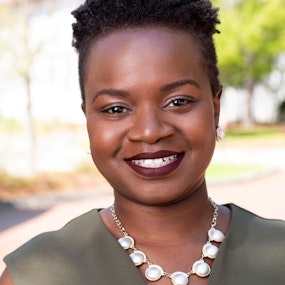
Dr. Cletis Allen
CEO/Charter School Board Member/Writer/Vegan
Dr. Cletis Allen is an Educational Thought Leader with over 13 years of experience in multiple roles in education, including elementary classroom educator, professional learning facilitator, curriculum auditor and writer, and governing board member for a local charter high school. With licensures in Reading, English Speakers of Other Languages (ESOL), and K-5 Science, Dr. Allen is the owner of her elementary education consulting firm, CLETIS Education Consulting LLC. In her doctoral work, “A Document Analysis of the Presence and Relationships between Schwab’s Commonplaces in a Literacy Curriculum that’s Adopted in High-Needs Schools,” Dr. Allen examines the role and interconnectedness of content, teacher, learner, and learning spaces in a literacy curriculum, and the opportunities to incorporate Culturally Responsive Literacy Instructional practices during curriculum adoption and instructional implementation. She works with large and small educational organizations to incorporate cross-curricular strategies from a Culturally Responsive Literacy Instruction (CRLI) perspective across content areas. In addition, Dr. Allen supports educators, educational leaders, and professionals with cultivating CRLI and inclusive practices in their daily instruction within P-5 learning spaces.
Outside of the education space, Queen Cle enjoys time with family and friends. She spends time reading, traveling, eating vegan food, and crocheting.
New to The Exit Interview: A Podcast for Black Educators?
Here are some great episodes to start with.

















